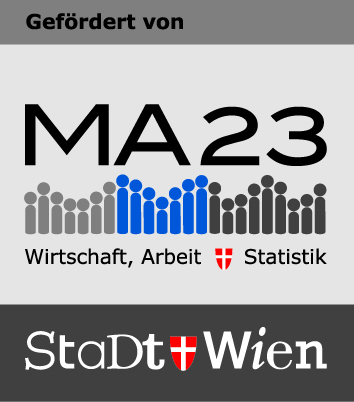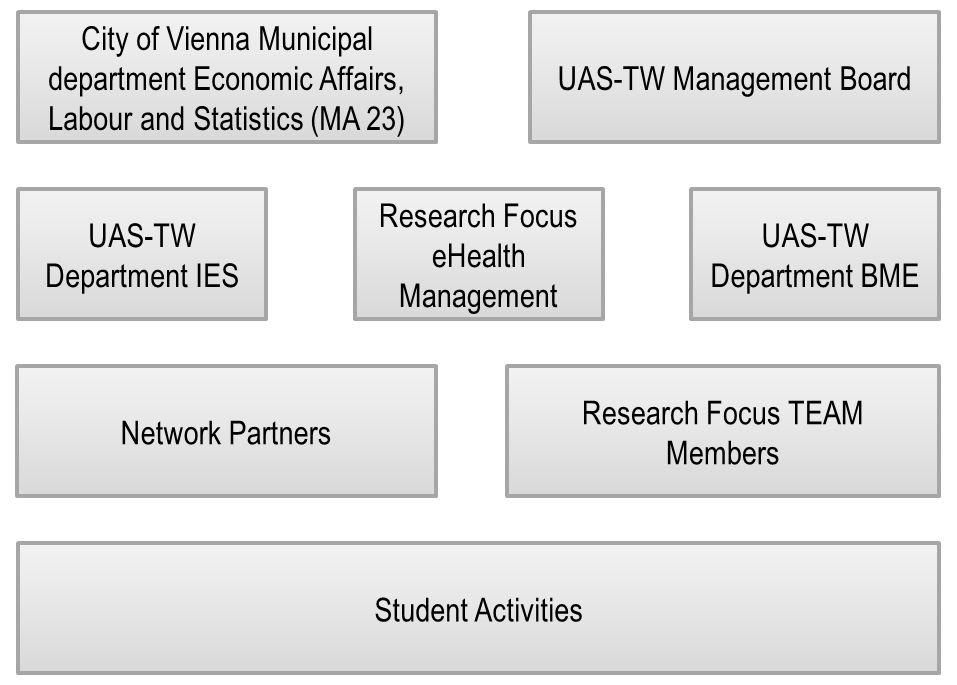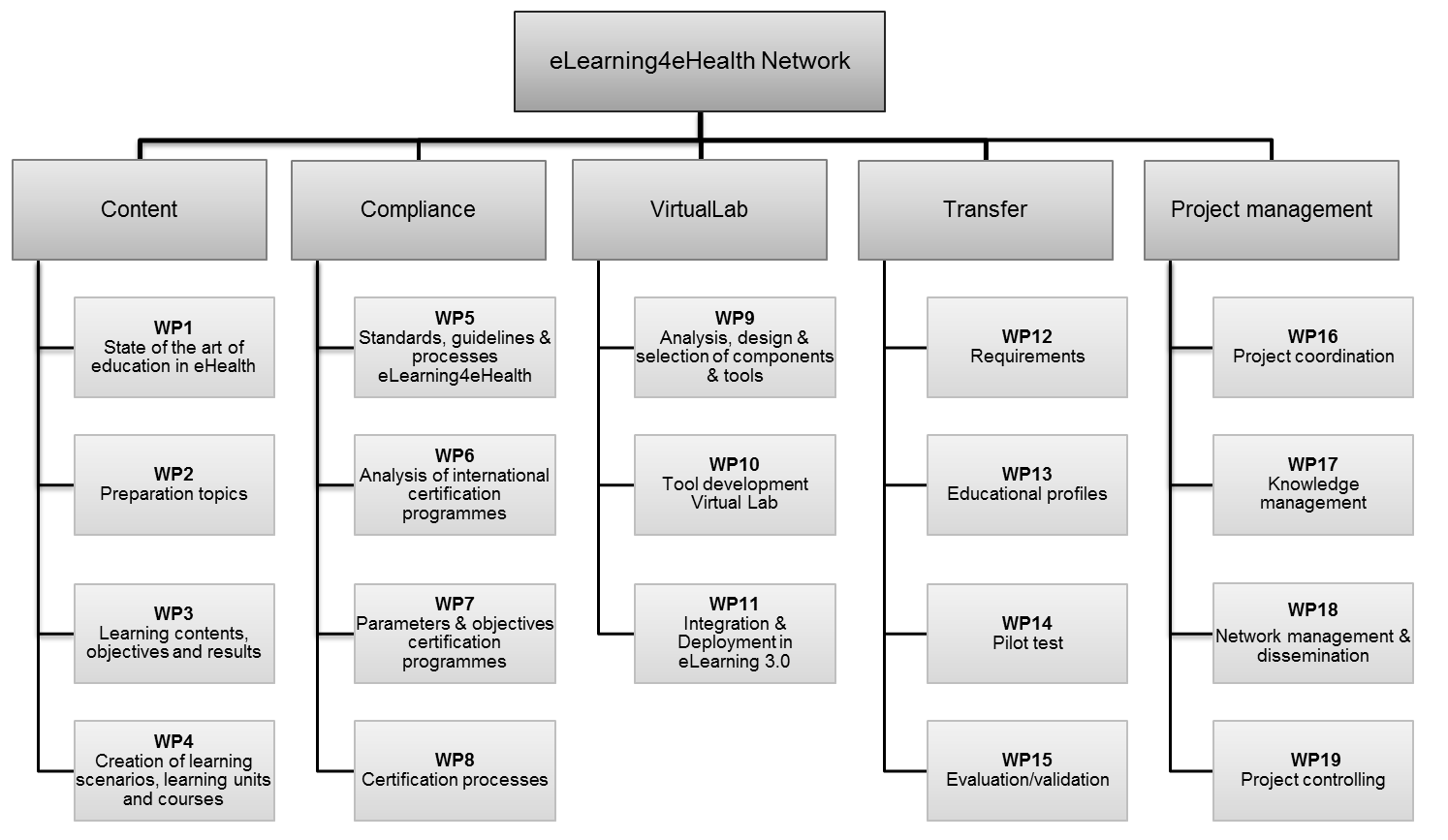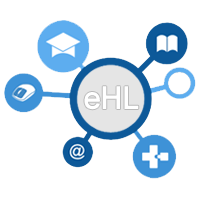
Acknowledgement
The project "eLearning4eHealth Network" is funded by the City of Vienna Municipal department Economic Affairs, Labour and Statistics (MA23).

Background
Importance of eHealth
eHealth still has a rising relevance in healthcare. A study of the European Commission on 2007 found that "recent research has suggested that the health ICT industry has the potential to be the third largest industry in the health sector with a global turnover of €50-60 billion, of which Europe represents one third." These numbers show that eHealth is in public focus and manifests itself not only on a national, but moreover on an international level. Due to this internationalisation of eHealth systems it is important to improve these systems by increasing the quality as well as by maintaining the reached quality level over longer periods of time. It is well-recognised that good systems have a high degree of quality built by high qualified people. The European eHealth Strategy Report defines “qualified human resources are another key ingredient for success.” Furthermore, it refers to relevant education and training as well as continuous professional development: "The most important part of eHealth investment that needs expanding is the eHealth skills and knowledge of healthcare staff and ICT suppliers’ staff. An expanded capability is essential to achieve more success and so help to boost eHealth investment." An approach to increase the qualification of human resources for eHealth related topics is the project eLearning4eHealth Network which deals with the following aspects:
- Need for highest degree of flexibility
- Diverse audience à diverse requirements
- Common, comparable & accredited qualification attestation
- eLearning as a teaching opportunity (academic education, extended vocational training)
- Certificates
eHealth European Interoperability Framework (EIF)
Recent European developments have targeted a more international movement towards interoperable eHealth solutions and applications. In 2013, the European Commission issued the “eHealth European Interoperability Framework” (EIF) performed by Deloitte. The EIF reports four levels of interoperability: legal, organisational, semantic and technical. Due to this definition three main “professions” can be identified, contributing to these interoperability levels: Management and legal experts will mainly deal with the topics of legal and organisational interoperability, whereas medical experts will contribute substantially to semantic interoperability. The technical interoperability is the main task of engineers. Using this allocation of topics three main professions that are working together in the multidisciplinary field of eHealth were established for the purpose of the project : Healthcare, Engineering and Management.
On the basis of the interoperability levels and the derived professions, three main knowledge areas are defined and further divided into subcategories as stated in the Matrix:
Knowledge from all these categories will be necessary in order to solve all issues within the interoperability areas that the EIF defines as the report demands a set up governance for eHealth standardization and interoperability until the year 2015.
International initiatives
There are several initiatives to foster the internationalisation of eHealth systems. These initiatives are EU wide as well as between EU and US.
One EU wide community is the eHealth Governance Initiative (eHGI) which began its work in February 2011. A total of 39 project partners including ministries of EU member states and some non-EU countries and representatives of healthcare industry, patients´ organisations etc. are working together to develop strategies, priorities and recommendations to coordinate the delivery of eHealth in Europe. It aims to build up interoperable structures in order to improve the quality of healthcare within the EU.
In 2012, the European Commission issued the eHealth Action Plan 2012-2020 which provides solutions for a wider interoperability in eHealth services, supporting research, development, innovation and competitiveness in eHealth, facilitating the uptake and ensuring wider deployment of eHealth as well as promoting policy dialogues and international cooperations on eHealth at a global level. It clarifies the opportunities and benefits of eHealth in Europe, but also the barriers to deployment of eHealth.
A transatlantic community is the EU-US eHealth Cooperation Initiative which is an affiliated project of the Standards & Interoperability Framework. Its vision is “To support an innovative collaborative community of public- and private-sector entities, including suppliers of eHealth solutions, working toward the shared objective of developing, deploying, and using eHealth science and technology to empower individuals, support care, improve clinical outcomes, enhance patient safety and improve the health of populations.”
Within the EU-US eHealth Cooperation Initiative, the Workforce Development Work Group is dealing with the issue of skill level definition for highly proficient eHealth professionals. The objective is the “definition and agreement of common standards for competence and professionalism” in eHealth.
Project Organisational Structure

The members of the project are situated within the Institute for Informations Engineering and Security (IES) and the Institute for Biomedical Engineering (BMT) of the University of Applied Sciences Technikum Wien.
The project itself is situated, managed and controlled within the Institute for Information Engineering and Security (IES). Within the R&D landscape of UAS Technikum Wien this project is part of the research focus eHealth. The team members are:
- Philipp Urbauer, MSc. - Project Supervisor
- FH-Prof. DI Alexander Mense - Project Controlling
- FH-Prof. DI Dr. Stefan Sauermann - Network management & Dissemination
- Mathias Forjan, Msc. - Researcher
- Matthias Frohner, MSc. - Researcher
- Juliane Herzog, MSc. - Researcher
- DI (FH) Birgit Pohn, MSc. - Researcher
Furthermore an international experts network comprising project partners from different institutions, countries, cultures and different backgrounds within the area of eHealth is developed. The extension of project partner/organisations fitting in the focused topic eHealth is targeted.
A very important aim of eHL is the improvement of the academic courses on the UAS Technikum Wien. Therefore a special focus on the sucessful integration of students from different Bachelor´s and Master´s degree programmes is laid. This could reach from taking place in form of participations on the projects survey to writing Bachelor´s or Master´s theses.
Objectives
The main objective of the project eHL is the setup of an international eHealth experts network in order to develop international coordinated education and certification programmes (academic and extended vocational) in eHealth.
To achieve this objective further goals of the eHL project can be structured as follows:

Work Packages
The project is divided in five content sections which include 19 work packages. The sections are:
Content: Based on a status analysis of education programmes and contents in eHealth, the definition, development and implementation of learning scenarios and contents takes place in the form of eLearning units and courses.
Compliance: Processes, parameters and responsibilities are designed and defined to the awarding of international eHealth qualification certificates.
VirtualLab: Selection, specification and development of simulated technical environment to integrate practical learning and project exercises within educational units
Transfer: In the first project phase, the knowledge transfer is carried out by an investigation of external user requirements for eLearning based education in eHealth. In the last project phase, the results will be tested and evaluated within academic education and professional trainings.
Project management: Higher project and network coordination, dissemination.

Milestones

